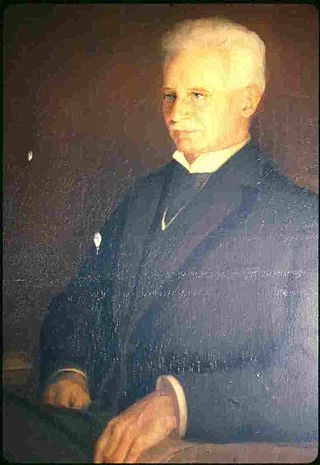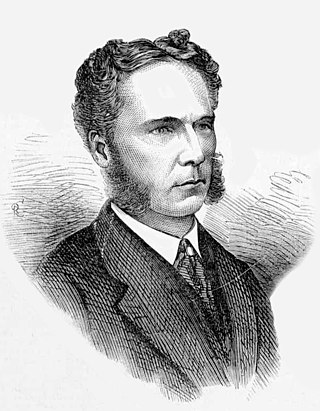
The Bank of New South Wales (BNSW), also known commonly as The Wales, was the first bank in Australia, being established in Sydney in 1817 and situated on Broadway. During the 19th century, the bank opened branches throughout Australia and New Zealand, expanding into Oceania in the 20th century. It merged with many other financial institutions, finally merging with the Commercial Bank of Australia in 1982 and being renamed to the Westpac Banking Corporation on 4 May that year under the Bank of New South Wales Act 1982.

Sir Charles Gregory Wade KCMG, KC, JP was Premier of New South Wales 2 October 1907 – 21 October 1910. According to Percival Serle, "Wade was a public-spirited man of high character. His ability, honesty and courage were quickly recognized and, though he could not be called a great leader, he was either in office or leader of the opposition for nearly the whole of his political life of 14 years. His career as a judge was short, but his sense of justice and grasp of principles and details, eminently fitted him for that position."
Sir Colin Archibald Sinclair was an Australian politician.

The National Party of Australia – N.S.W., commonly known as "The Nationals" or the NSW Nationals, is a political party in New South Wales which forms the state branch of the federal Nationals and has traditionally represented graziers, farmers, and rural voters generally.

Sir William Portus Cullen was an Australian barrister, the 7th Chief Justice of New South Wales, Lieutenant-Governor of New South Wales, and Chancellor of the University of Sydney.

Sir Frederick Richard Jordan (1881–1949) was an Australian barrister, the 9th Chief Justice of New South Wales, and Lieutenant-Governor of New South Wales.
The Chief Justice of New South Wales is the senior judge of the Supreme Court of New South Wales and the highest-ranking judicial officer in the Australian state of New South Wales. The Chief Justice is both the judicial head of the Supreme Court as well as the administrative head, responsible for arranging the business of the court and establishing its rules and procedures.

The Postmaster-General of New South Wales was a position in the government of the colony of New South Wales. This portfolio managed the postal department of the New South Wales Government and was in charge of all postal and communications services in the colony prior to the Federation of Australia, from 1835 to 1901. Upon Federation, Section 51(v) of the Constitution of Australia gave the Commonwealth exclusive power for "postal, telegraphic, telephonic, and other like services".
The New South Wales Crown Solicitor's Office (CSO) is an executive government agency of the New South Wales Department of Justice in Australia that has the role of providing legal services to the government, its agencies, and its statutory authorities. The Office practices in twelve areas of law, namely administrative law, child protection law, commercial law, community law, constitutional law, coronial law and inquiries, criminal law, employment law, government law, native title law, property law, and tort law. The Office frequently instructs barristers with regard to civil matters.
Sir Matthew Henry Stephen, was a politician and Puisne Judge in New South Wales.

William John Foster was a politician and Supreme Court judge in colonial New South Wales, Attorney General from 1877 to 1878.

Sir Henry Edward Manning, KBE QC was an Australian lawyer and politician. He was a member of the New South Wales Legislative Council for 25 years from 1932 to 1958 and also served as the Attorney General and Vice-President of the Executive Council from 1932 to 1941.

Sir Joseph George Long Innes, was a judge and politician in colonial Australia, and Attorney General of New South Wales from 1873 to 1875.

John Garland was a Scottish-born Australian politician.

Solicitor General for New South Wales, known informally as the Solicitor General, is one of the Law Officers of the Crown, and the deputy of the Attorney General. They can exercise the powers of the Attorney General in the Attorney General's absence. The Solicitor General acts alongside the Crown Advocate, and Crown Solicitor, and serves as one of the legal and constitutional advisers of the Crown and its government in the Australian state of New South Wales.
The Stephen family is a prominent legal dynasty in Australia that has produced a number of judges and jurists. Members include:











